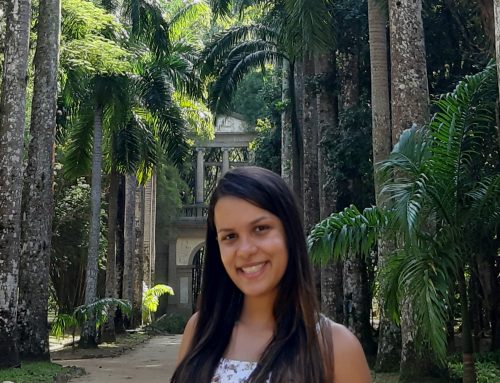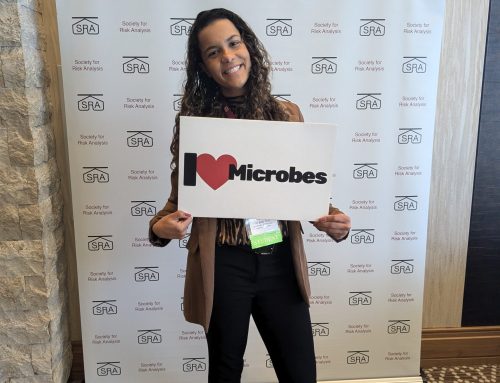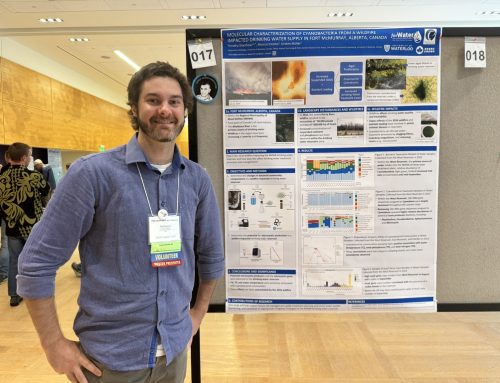By Judy MacDonald, photos courtesy of AWWA.
Three Canadian women won awards at the 2014 American Water Works Association (AWWA) Annual Conference & Exposition. The academic achievement awards recognize graduate students who have made outstanding contributions to the public water supply industry during their academic career. The publications award honours the most notable contribution, scientific or practical, to the public water supply profession as published in the Journal AWWA.
Although many well-known Canadians have won these awards in the past, winning three awards in one year is unprecedented. It demonstrates the level of excellence and commitment of young professional women in Canada.
Dr. Monica Emelko, Associate Professor at the University of Waterloo, commented:
“In the over 15 years that I have been a member of the AWWA, I have observed a notable increase in the number of female presenters and leaders at AWWA conferences and in AWWA volunteerism and governance. It is thrilling to see that this growth has also been evidenced at the student level in academic awards and student leadership. While I am honoured to have supervised one such successful student, I believe that the supportive and collaborative environment between academia, industry, and government has contributed to enabling Canadian women to meet their full professional potential.”
Almost 100 years since the Canadian Section of AWWA was formed in 1916, Canada continues to produce leaders who are setting their sights on protecting public health for the next 100 years and beyond. “It’s a positive sign that bright and talented young people have chosen water as a career,” said Dr. Vanessa Speight, President of Latis Associates, a woman-owned firm providing environmental and engineering services. “Our challenge is to find leadership opportunities to engage and keep them in water.”
Academic Achievement Award for Doctoral Dissertation
(L-R): Dr. Susan Andrews (University of Toronto), Dr. Shen
(CH2M HILL), Dr. Jeanine Plummer (Chair, AWWA Water
Science and Research Division).
Dr. Ruqiao (Emma) Shen, from the University of Toronto, won first place for her dissertation entitled ”Potential of Pharmaceuticals and Personal Care Products (PPCPs) as Nitrosamine Precursors during Drinking Water Disinfection”. Dr. Shen’s work was the first extensive study to demonstrate the formation of the disinfection byproduct group known as nitrosamines from a list of 20 selected PPCPs.
Her work has made significant contributions to the global study of nitrosamines and has re-opened discussions regarding the presence of pharmaceuticals in water sources. “I consider myself very lucky to be a woman working in the drinking water industry.” said Dr. Shen. “I’ve seen more and more female students at school and at work, and I’ve met excellent women leaders who I really look up to. They set great examples for young female professionals. ”
Dr. Shen is currently working at CH2M HILL (Toronto) as a junior process designer.
Academic Achievement AWWA Award for Master’s Thesis
(L-R): Dr. Monica Emelko (University of Waterloo), Ms.
McLellan (Stantec), Dr. Jeanine Plummer (Chair, AWWA
Water Science and Research Division).
Ms. Nicole McLellan, MASc., from the University of Waterloo, won second place for her thesis entitled “Factors Affecting the Transport of Pathogens & Pathogen Surrogates in Saturated Porous Media: Implications for Natural and Engineered Drinking Water Filters.”
Her work suggests that synergistic effects between physical factors (i.e., media grain size and uniformity coefficient) and chemical factors (i.e., ionic strength and natural organic matter) should be considered when assessing pilot- and full-scale filter performance demonstrations. Several conclusions regarding bench-scale study design were also made.
The implications are significant. By better understanding the mechanisms of natural and engineered filters, industry can improve filter design and operation, regulatory guidance, and ultimately improve public health protection.
Ms. McLellan chose to work in drinking water treatment as a result of volunteer work in developing nations. She has a long list of other accomplishments, including her role as a founding member and president of the University of Waterloo Ontario Water Works Association Student Chapter, co-founder of a Waterlution Innovation Hub in the Grand River Watershed, and Vice-Chair of the AWWA Source Water Protection Committee.
Ms. McLellan is currently a full-time Ph.D Candidate at the School of Environmental Sciences at the University of Guelph, sponsored through an Industrial NSERC Grant by the Water Group at Stantec (Kitchener) where she is employed as an environmental scientist.
Publications Award – Journal AWWA Best Paper 2014
Ms. Monica Prosser (Sameng), with her AWWA Award for Best Paper.
Ms. Monica Prosser, MASc., was the lead author of the article entitled “Life-cycle energy analysis of performance versus age-based pipe replacement schedules” Ms. Prosser’s co-authors and Master’s supervisors were Vanessa Speight (Latis Associates) and Yves Filion (Queen’s University).
Her work entailed developing a life cycle energy analysis (LCEA) for a large drinking water system. A LCEA quantifies the energy associated with treating and pumping the volume of water lost through pipe leakage. It then compares this to the “embodied energy” of replacement pipes. Embodied energy includes the energy linked to the fabrication, transportation, excavation, compaction and installation of new replacement pipes (including asphalt, backfill, bedding, pipe and casing).
LCEA is an important tool in studying whole-of-life energy considerations. Its importance is growing as water utility managers and planners consider ways to reduce overall energy consumption. This is typically the largest cost for operations, as well as greenhouse gas emissions.
Ms. Prosser’s work provides a methodology for water utilities to follow when quantifying the different components that factor into the complex decision-making process.
She is currently working for Sameng Inc. in Edmonton, Alberta, as a water resources engineer.
Judy MacDonald, P. Eng., is the Past-Chair, AWWA Canadian Affairs Committee. This article appeared in ES&E’s September/October 2014 issue.








